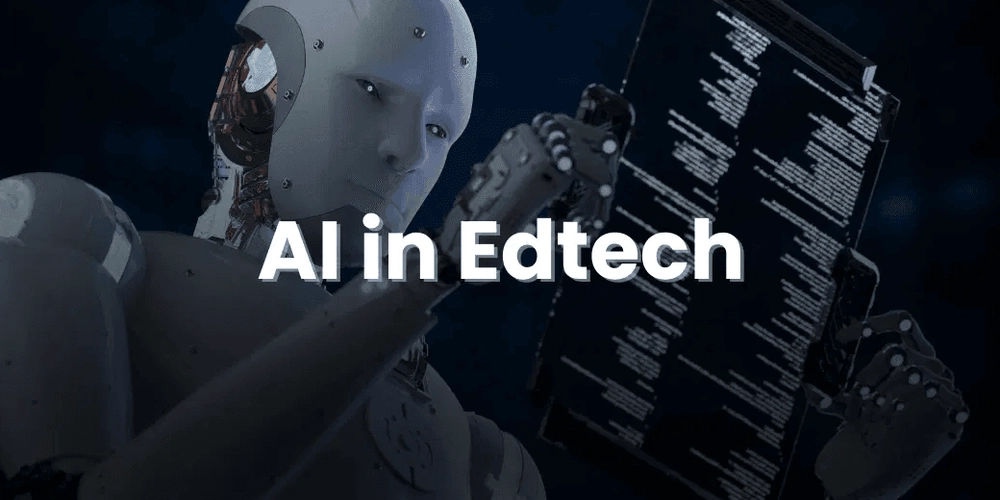How AI Is Revolutionizing Adaptive Learning in EdTech
The education technology (EdTech) sector has witnessed a transformative shift over the last few decades, largely driven by advances in artificial intelligence (AI). With a growing emphasis on personalized learning, AI is reshaping the way students learn, educators teach, and institutions deliver education. One of the most exciting developments in this space is the rise of adaptive learning, a method of education that tailors learning experiences to the needs, strengths, and weaknesses of individual students. By harnessing the power of AI, adaptive learning has become more personalized, scalable, and efficient, offering new opportunities for students and educators alike. In this article, we’ll explore how AI is revolutionizing adaptive learning in EdTech, the benefits it brings, its real-world applications, challenges, and its promising future. Additionally, the role of an AI development company is critical in driving the innovation and continuous improvement of AI-powered learning platforms, making them more accessible and effective for users worldwide. What Is Adaptive Learning? Adaptive learning refers to a learning system that adjusts the content, pace, and difficulty based on the learner’s progress and understanding. Unlike traditional education models, where all students follow the same path at the same pace, adaptive learning focuses on meeting each student where they are in their learning journey. This dynamic approach not only helps students learn at their own pace but also fosters a deeper understanding of the material by addressing gaps in knowledge. For example, if a student struggles with a particular concept, the system might provide additional resources or exercises to help reinforce that idea before moving on. Conversely, if a student demonstrates mastery of a concept, the system can accelerate their progress, providing more challenging content to push their skills further. Key benefits of adaptive learning include: Personalization: Tailored content that aligns with individual learning styles and paces. Real-time Feedback: Immediate responses that help students adjust their learning strategies. Flexibility: The ability to learn at one’s own pace, which is particularly valuable in remote and online education settings. Role of AI in Adaptive Learning AI is the backbone of adaptive learning technologies, enabling systems to understand, predict, and respond to student behavior and performance. Here are some of the ways AI is contributing to adaptive learning: Machine Learning Algorithms Machine learning, a subset of AI, plays a pivotal role in adaptive learning. By analyzing a student’s performance in real-time, machine learning algorithms can identify patterns in their learning behavior. These algorithms help predict how a student will respond to various types of content and can adjust the difficulty level or pace accordingly. The system learns over time, becoming more accurate in predicting and adapting to each student’s learning needs. For instance, a student struggling with math problems can be presented with additional practice questions or simplified content until they master the concept. On the other hand, a student who excels can be presented with more advanced challenges to keep them engaged and motivated. Natural Language Processing (NLP) AI-powered adaptive learning platforms often integrate natural language processing (NLP) to interpret and respond to students’ written answers. This enables AI to engage in conversations with students, provide personalized feedback, and even act as a virtual tutor. NLP can be especially useful in platforms that teach languages or writing, as the AI can analyze grammar, vocabulary, and sentence structure, offering real-time suggestions for improvement. Predictive Analytics AI-driven predictive analytics helps educators anticipate a student’s future performance. By analyzing data such as past exam scores, participation in lessons, and even time spent on certain tasks, AI systems can predict which students may need additional support and which students are at risk of falling behind. This allows educators to intervene early, ensuring that students get the help they need before gaps in their knowledge become too large. Content Customization AI allows for the dynamic customization of content based on the learner’s performance. This might involve changing the difficulty level, offering different types of content (videos, articles, quizzes), or adjusting the sequencing of lessons. By using algorithms that assess how a student engages with and performs on different types of tasks, AI can deliver content in the most effective format for that student, whether that be through interactive simulations, videos, or traditional textbooks. Real-World Applications of AI in Adaptive Learning in Edtech The integration of AI in adaptive learning is not just theoretical – there are already several EdTech platforms harnessing i

The education technology (EdTech) sector has witnessed a transformative shift over the last few decades, largely driven by advances in artificial intelligence (AI). With a growing emphasis on personalized learning, AI is reshaping the way students learn, educators teach, and institutions deliver education. One of the most exciting developments in this space is the rise of adaptive learning, a method of education that tailors learning experiences to the needs, strengths, and weaknesses of individual students. By harnessing the power of AI, adaptive learning has become more personalized, scalable, and efficient, offering new opportunities for students and educators alike.
In this article, we’ll explore how AI is revolutionizing adaptive learning in EdTech, the benefits it brings, its real-world applications, challenges, and its promising future. Additionally, the role of an AI development company is critical in driving the innovation and continuous improvement of AI-powered learning platforms, making them more accessible and effective for users worldwide.
What Is Adaptive Learning?
Adaptive learning refers to a learning system that adjusts the content, pace, and difficulty based on the learner’s progress and understanding. Unlike traditional education models, where all students follow the same path at the same pace, adaptive learning focuses on meeting each student where they are in their learning journey. This dynamic approach not only helps students learn at their own pace but also fosters a deeper understanding of the material by addressing gaps in knowledge.
For example, if a student struggles with a particular concept, the system might provide additional resources or exercises to help reinforce that idea before moving on. Conversely, if a student demonstrates mastery of a concept, the system can accelerate their progress, providing more challenging content to push their skills further.
Key benefits of adaptive learning include:
Personalization: Tailored content that aligns with individual learning styles and paces.
Real-time Feedback: Immediate responses that help students adjust their learning strategies.
Flexibility: The ability to learn at one’s own pace, which is particularly valuable in remote and online education settings.
Role of AI in Adaptive Learning
AI is the backbone of adaptive learning technologies, enabling systems to understand, predict, and respond to student behavior and performance. Here are some of the ways AI is contributing to adaptive learning:
Machine Learning Algorithms
Machine learning, a subset of AI, plays a pivotal role in adaptive learning. By analyzing a student’s performance in real-time, machine learning algorithms can identify patterns in their learning behavior. These algorithms help predict how a student will respond to various types of content and can adjust the difficulty level or pace accordingly. The system learns over time, becoming more accurate in predicting and adapting to each student’s learning needs.
For instance, a student struggling with math problems can be presented with additional practice questions or simplified content until they master the concept. On the other hand, a student who excels can be presented with more advanced challenges to keep them engaged and motivated.
Natural Language Processing (NLP)
AI-powered adaptive learning platforms often integrate natural language processing (NLP) to interpret and respond to students’ written answers. This enables AI to engage in conversations with students, provide personalized feedback, and even act as a virtual tutor.
NLP can be especially useful in platforms that teach languages or writing, as the AI can analyze grammar, vocabulary, and sentence structure, offering real-time suggestions for improvement.
Predictive Analytics
AI-driven predictive analytics helps educators anticipate a student’s future performance. By analyzing data such as past exam scores, participation in lessons, and even time spent on certain tasks, AI systems can predict which students may need additional support and which students are at risk of falling behind.
This allows educators to intervene early, ensuring that students get the help they need before gaps in their knowledge become too large.
Content Customization
AI allows for the dynamic customization of content based on the learner’s performance. This might involve changing the difficulty level, offering different types of content (videos, articles, quizzes), or adjusting the sequencing of lessons. By using algorithms that assess how a student engages with and performs on different types of tasks, AI can deliver content in the most effective format for that student, whether that be through interactive simulations, videos, or traditional textbooks.
Real-World Applications of AI in Adaptive Learning in Edtech
The integration of AI in adaptive learning is not just theoretical – there are already several EdTech platforms harnessing its potential. Let’s take a look at some real-world applications:
Khan Academy
Khan Academy is a well-known platform that uses adaptive learning powered by AI. The system monitors students' progress and adjusts lessons and exercises accordingly, ensuring that learners stay engaged and challenged. Khan Academy’s personalized learning dashboard provides students with instant feedback on their progress, helping them understand where they need to focus their efforts.
Duolingo
Duolingo, a language-learning app, uses AI and machine learning to adapt lessons based on a user’s strengths and weaknesses. The system dynamically adjusts the difficulty of exercises and revisits material that a student struggles with, ensuring that learners retain information and gradually build fluency in a new language.
Squirrel AI
Squirrel AI is an adaptive learning platform that focuses on K-12 education. The system uses AI to provide personalized lessons in subjects like math, science, and English. By continually assessing student performance, the platform tailors lessons to individual learning needs, improving both engagement and learning outcomes.
Century Tech
Century Tech, a UK-based EdTech company, uses AI and cognitive neuroscience to create personalized learning paths for students. Its platform continuously analyzes students' performance and adapts content in real-time. Century Tech’s approach is designed to make learning more efficient, helping students achieve better results in less time.
Benefits of AI in Adaptive Learning in Edtech
AI-driven adaptive learning benefits all stakeholders in the educational ecosystem.
For Students
For students, adaptive learning systems provide a more personalized and engaging learning experience. The AI-driven approach helps learners progress at their own pace, ensuring that they are neither left behind nor bored by content that is too easy.
With real-time feedback and customized content, students are more likely to retain information and stay motivated throughout their learning journey.
For Educators
Teachers benefit from AI’s ability to provide actionable insights into student performance. Rather than spending time grading papers or manually tracking progress, educators can focus on more high-level teaching tasks.
AI tools can highlight areas where students need additional support, allowing teachers to intervene more effectively and provide targeted assistance.
Educational Institutions
Schools and universities can scale personalized education with the help of AI-powered adaptive learning systems. These systems can accommodate large numbers of students, each with their own learning needs, without requiring more teachers or resources.
By enhancing learning outcomes, AI-driven adaptive learning can help institutions improve overall performance and student satisfaction.
Challenges of AI in Adaptive Learning
Despite its many benefits, AI in adaptive learning also comes with challenges that need to be addressed:
Data Privacy and Security: AI systems require large amounts of data to function effectively, raising concerns about how student data is collected, stored, and protected.
Algorithmic Bias: AI systems can sometimes reinforce biases if not properly trained, leading to unfair treatment of certain student groups.
Over-reliance on Automation: While AI can enhance learning, it’s crucial that educators remain involved in the process to provide the emotional support and context that AI cannot offer.
Accessibility: Not all students have equal access to the technology required for AI-powered adaptive learning, leading to potential disparities in learning opportunities.
The Future of AI in Adaptive Learning
The future of AI in adaptive learning is promising. As AI technology continues to advance, we can expect to see even more sophisticated systems that can understand and predict student behavior with greater accuracy. Future developments may include:
Generative AI: Creating personalized content on the fly, from quizzes to essays.
Emotion Detection: AI systems that can detect a student’s emotional state and adjust the learning environment accordingly.
AR/VR Integration: Using AI in combination with augmented and virtual reality to create immersive learning experiences.
Ultimately, AI will play a key role in creating lifelong, personalized learning environments where students can learn continuously, regardless of age or location.
Conclusion
AI is undeniably transforming the landscape of education, with adaptive learning at the forefront of this revolution. By harnessing the power of AI, EdTech platforms are offering more personalized, efficient, and engaging learning experiences for students. While challenges remain, the future of AI in education holds immense potential to create a more inclusive and effective learning environment.
As AI continues to evolve, it will further enhance the way students learn and teachers teach. The key to maximizing its potential lies in finding the right balance between technological advancements and human touch in the learning process.
Are you ready to embrace the future of education? Explore the world of AI-powered adaptive learning and discover how it can transform your educational experience. Whether you're a student, educator, or institution, it’s time to take advantage of AI’s potential to create personalized, engaging, and effective learning journeys. Get started today!
















_Weyo_alamy.png?width=1280&auto=webp&quality=80&disable=upscale#)















































